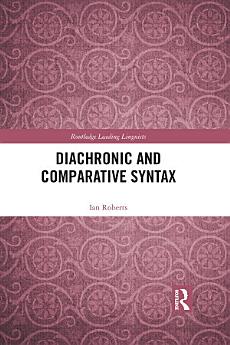Diachronic and Comparative Syntax
ছেপ্তে ২০১৮ · Routledge
৫.০star
১ টা পৰ্যালোচনাreport
ইবুক
572
পৃষ্ঠা
family_home
যোগ্য
info
reportমূল্যাংকন আৰু পৰ্যালোচনা সত্যাপন কৰা হোৱা নাই অধিক জানক
এই ইবুকখনৰ বিষয়ে
This book brings together for the first time a series of previously published papers featuring Ian Roberts’ pioneering work on diachronic and comparative syntax over the last thirty years in one comprehensive volume. Divided into two parts, the volume engages in recent key topics in empirical studies of syntactic theory, with the eight papers on diachronic syntax addressing major changes in the history of English as well as broader aspects of syntactic change, including the introduction to the formal approach to grammaticalisation, and the eight papers on comparative syntax exploring head-movement, the nature and distribution of clitics, and the nature of parametric variation and change. This comprehensive collection of the author’s body of research on diachronic and comparative syntax is an essential resource for scholars and researchers in theoretical, comparative, and historical linguistics.
মূল্যাংকন আৰু পৰ্যালোচনাসমূহ
৫.০
১ টা পৰ্যালোচনা
লিখকৰ বিষয়ে
Ian Roberts is Professor of Linguistics in the Department of Linguistics at the University of Cambridge. His most recent publications include Syntactic Variation in Minimalist Syntax, with Theresa Biberauer, Anders Holmberg and Michelle Sheehan (2010) and Agreement and Head Movement (2010).
এই ইবুকখনক মূল্যাংকন কৰক
আমাক আপোনাৰ মতামত জনাওক।
পঢ়াৰ নির্দেশাৱলী
স্মাৰ্টফ’ন আৰু টেবলেট
Android আৰু iPad/iPhoneৰ বাবে Google Play Books এপটো ইনষ্টল কৰক। ই স্বয়ংক্রিয়ভাৱে আপোনাৰ একাউণ্টৰ সৈতে ছিংক হয় আৰু আপুনি য'তে নাথাকক ত'তেই কোনো অডিঅ'বুক অনলাইন বা অফলাইনত শুনিবলৈ সুবিধা দিয়ে।
লেপটপ আৰু কম্পিউটাৰ
আপুনি কম্পিউটাৰৰ ৱেব ব্রাউজাৰ ব্যৱহাৰ কৰি Google Playত কিনা অডিঅ'বুকসমূহ শুনিব পাৰে।
ই-ৰীডাৰ আৰু অন্য ডিভাইচ
Kobo eReadersৰ দৰে ই-চিয়াঁহীৰ ডিভাইচসমূহত পঢ়িবলৈ, আপুনি এটা ফাইল ডাউনল’ড কৰি সেইটো আপোনাৰ ডিভাইচলৈ স্থানান্তৰণ কৰিব লাগিব। সমৰ্থিত ই-ৰিডাৰলৈ ফাইলটো কেনেকৈ স্থানান্তৰ কৰিব জানিবলৈ সহায় কেন্দ্ৰত থকা সবিশেষ নিৰ্দেশাৱলী চাওক।







